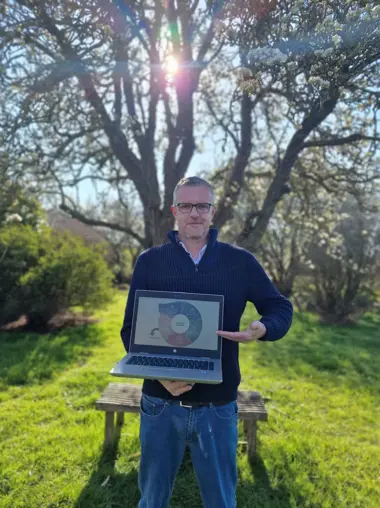Each April, countries and organisations around the world highlight and promote awareness and acceptance of autism. Paul Kent of Smiths Detection reflects on how it can impact your personal and professional life.
In 2015 at 37 years old, Paul Kent was given a diagnosis of Higher Functioning Aspergers. Until then, he had spent his life realising he was different but not knowing why.
“During my early years at school I was liked but never really accepted into a group. As a teenager, the differences became more acute but I still didn’t know why; and being the tallest (I’m now 6’5” or 198cm) was just an additional red flag for the bullies. I developed interests I could pursue alone and, amongst other things, displayed an early passion for engineering by designing and building complex models with technical Lego.”
Paul studied at Manchester University, where he absorbed information like a sponge and was always keen to learn how to work better. He gained a Master’s Degree in Electronic Engineering – Japanese programme and went on to join the aerospace industry as a Systems Engineer.
“Life got tougher in the corporate world and I did have some spectacular blow-ups with colleagues and managers. Eventually, I went to see a clinical psychologist and got my diagnosis - Higher Functioning Aspergers ( the terms have since changed) is generally indicated by milder signs and symptoms of Autistic Spectrum Disorder. Now I had a reason for being different, I could research it and find some meaning to it all. I felt diagnosis gave validity to my workplace frustrations. Employers did give me some support but despite everything I had achieved over 16 years, promotion was very elusive. Time to move on – next stop Senior Systems Engineer at Smiths Detection in 2018.”
Strengths and challenges
Some of the traits Paul experiences cause him distress and frustration. They include:
- Exceptional hearing - he can hear minute noises others rarely notice but a boisterous room can lead to distress
- Inappropriate invasion of personal space or touching
- Hyper-empathy – feeling the emotional weight of situations, music and stories
- Sensitivity to light
“Without realising it, I have increasingly learned how to manage the widening gaps between so-called normal society and my own ideas on how society should behave. For example, I believe we should all say what we think and mean what we say but this doesn’t always go down well with others! One of several intolerances is people who fail to do something they have promised and are not prepared to mitigate or apologise for this failure. Now skilled at understanding the broader picture, I can see the impact of failed promises on quality, capabilities or colleagues and this, in turn, affects my emotional state.”
“I am easily bored and also have an almost uncontrollable desire to fix things which is driven by the goal of a happy environment which, in turn, makes me more effective. Put the two together and the result is an ability to solve and/or improving multi-disciplinary challenges ranging from reorganising server systems to developing and applying processes for urgent new regulations. Tackling these tasks on top of my day job.”
Support and encouragement
Having been diagnosed relatively recently and with milder symptoms, Paul finds it hard to judge whether attitudes to autism have changed over the years but he does believe it is less stigmatised. Certainly, he has found Smiths Detection very supportive.
“The company has helped me in many ways, allowing my side projects and providing not just engineering training but also help with interpersonal skills via the Inclusion, Diversity & Belonging Forum - which encourages inclusion across many different groups of people. I’ve also had support from Mental Health Champions; and my current role of Global Restricted Substances Manager was created after colleagues and I presented a compelling business case for it. This job is the ultimate challenge in integrating multiple complex systems – once I’ve mastered it, I will be looking for even bigger challenges within the company.”
Everyone is different
As with all people, those on the spectrum vary enormously. To some degree, most find it difficult to process sensory experiences; adapt to alternative learning and problem solving styles; communicate; and participate in neurotypical social interaction. They have a strong desire to maintain or establish order and acquire deep, sustained interests. Repetitive movements and behaviours are also common.
“Even long before diagnosis, I have always embraced and celebrated my differences and generally, so have others. If they don’t, I have found ways to work with them, including happily accepting being thought of as weird – not because it’s easier but because we are all different and it’s just a matter of degrees. People respond as they do for many reasons.”
“In the end, my needs are identical to any other employee – clarity, planning, guidance, stability and respect. I ‘m just less tolerant of nonsense than most which makes everything more of a challenge!”

